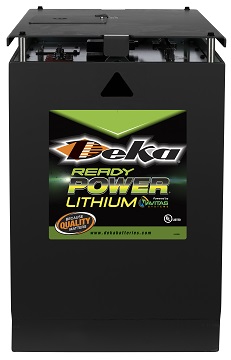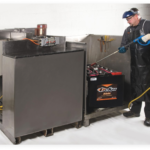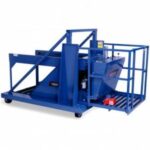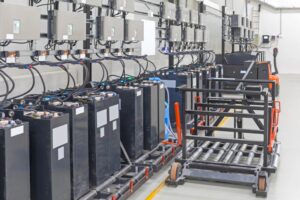In the ever-evolving world of material handling, forklifts have been a staple for decades, efficiently transporting goods in warehouses and industrial settings. Traditionally, these workhorses relied on lead-acid batteries for power. However, with advancements in technology, lithium batteries have emerged as a game-changing option, promising improved performance, lower maintenance costs, and a greener future.
In this blog, we will explore the benefits of lithium batteries for forklifts and why they are becoming an attractive choice for businesses worldwide.
This information will help research lithium batteries and if they are right for your company, however, If you are ready to purchase lithium batteries for your forklifts, feel free to contact us.
Advantages of Lithium Batteries For Forklifts
If you are unfamiliar with why lithium batteries are a hot topic as an alternative for forklift batteries and other equipment, let’s get you up to speed. There are several benefits that lithium batteries bring that traditional lead-acid batteries do not provide.
Here are the reasons many are switching to lithium-ion batteries:
1. Enhanced Efficiency and Productivity
Lithium batteries bring a considerable advantage in terms of energy efficiency. Unlike lead-acid batteries, which experience voltage drop-offs as they discharge, lithium batteries maintain a stable voltage throughout their entire usage cycle. This means that forklifts powered by lithium batteries maintain consistent performance, enabling higher speeds and increased lift capacity as the battery depletes. As a result, productivity is improved as there is less downtime spent waiting for batteries to recharge or swap out.
2. Extended Operating Hours
The increased energy density of lithium batteries allows for longer operating hours on a single charge. Forklifts equipped with lithium batteries can often run for up to two or three shifts before requiring a recharge. This capability is a significant advantage in industries with round-the-clock operations, as it eliminates the need for multiple batteries or lengthy charging intervals, leading to better workflow efficiency and reduced labor costs.
3. Faster Charging and Opportunity Charging
Lithium batteries boast much faster charging times compared to lead-acid batteries. While conventional lead-acid batteries may require hours to charge fully, lithium batteries can reach an 80% charge within one to two hours, with some fast-charging options completing the process even faster. This means less time spent waiting for charging, and forklifts can quickly get back into action.
Moreover, lithium batteries support opportunity charging, allowing for partial charges during breaks or periods of inactivity without causing damage to the battery. This flexibility further reduces downtime and ensures continuous operations.
4. Lower Maintenance Costs
Forklifts with lead-acid batteries require regular maintenance, such as water refilling, equalizing charges, and cleaning of battery terminals. In contrast, lithium batteries are virtually maintenance-free. They do not require water refilling, and their sealed construction reduces the risk of acid spills and corrosion. As a result, businesses can save significantly on maintenance costs and improve overall cost efficiency.
5. Environmental Impact and Sustainability
One of the most critical factors driving the adoption of lithium batteries in forklifts is their positive impact on the environment. Lead-acid batteries contain toxic materials like lead and sulfuric acid, which can be harmful if not properly disposed of. In contrast, lithium batteries are much more environmentally friendly. They have a longer lifespan and can often be recycled, reducing the overall environmental footprint.
With increasing global awareness of sustainable practices, businesses that embrace lithium-powered forklifts can demonstrate their commitment to eco-friendly operations, which can be a significant marketing advantage and contribute to a greener, more sustainable future.
Lithium batteries will provide less downtime, last longer, provide better performance, and are much more environmentally friendly. Businesses looking to increase long-term profitability, improve efficiency and those seeking green initiatives are finding lithium batteries to be a favorable option.
The Downside of Lithium Batteries
While lithium batteries offer numerous advantages for forklifts, there are also some potential drawbacks and challenges to consider. The two major roadblocks are the high costs of lithium batteries and handling the implementation of something new.
Higher Initial Cost: The upfront cost of lithium batteries is generally higher than traditional lead-acid batteries. This can be a significant deterrent for businesses with budget constraints or those operating on a tight financial margin.
Maintenance Learning Curve: Lithium batteries require much less maintenance, but new internal processes may need to be implemented. Employees will need to be taught how to read and understand the monitoring software of the battery and a new internal standard operating procedure may need to be created.
We encourage businesses to conduct a thorough cost-benefit analysis, weigh the potential risks, and ensure that the organization has the resources and expertise to handle lithium battery technology safely and efficiently.
Keep in mind, as the technology evolves and becomes more accessible, the cons associated with lithium batteries may diminish over time, making them an increasingly attractive option for forklifts in the future.
Other Industrial Equipment and Vehicles that Benefit From Using Lithium Batteries
Lithium batteries are a great option for forklifts, but they are not the only equipment you may want to use them for. Lithium batteries offer the same advantages for many other industrial equipment and vehicles. Here are some other options.
- Pallet jacks
- Golf carts
- Personnel carriers
- Electric scrubbers
- Lifts
- Ect.
If it is currently powered by a traditional lead-acid industrial battery, then it can likely accommodate a lithium-ion battery. Explore the cost of ownership of the various equipment you own to see if transitioning the entire fleet of vehicles to lithium makes sense.
Are Lithium Batteries Right for Your Forklifts and Other Industrial Equipment?
Transitioning from traditional lead-acid batteries to lithium batteries for motive equipment, such as forklifts, is a significant decision that requires careful consideration. The upfront costs can be a hard decision to overcome but the long-term profitability makes them very attractive.
To best understand if replacing your forklift batteries with lithium ones is the right choice, we recommend looking at your business goals as well as the long-term cost of ownership.
Compare the total cost of ownership of traditional lead-acid batteries with lithium batteries over their respective lifespans. Consider factors such as initial purchase cost, maintenance expenses, charging infrastructure upgrades, and expected battery lifespan.
You will also want to consider the impact on productivity and downtime. Analyze the impact of battery-related downtime on productivity and operational efficiency. If frequent battery swaps or recharging breaks disrupt workflows, lithium batteries’ longer operating hours and faster charging times may lead to increased productivity and reduced downtime.
Don’t forget also to consider overall business goals and if the switch would impact them. For example, lithium batteries could help back your company’s “green” initiatives.
If you have questions, make sure to speak with a battery supplier who can provide you with all the necessary information your company needs.
Where to Purchase Lithium Ion Batteries for Forklifts (and other equipment)
Businesses can purchase lithium batteries for their forklifts, vehicles, and equipment from several places. Industrial battery suppliers, like us here at Beal, will likely be your best bet for finding the right lithium batteries for your various equipment. However, you may also be able to purchase them from your forklift dealer, or online retailers.
When purchasing lithium batteries for forklift use, ensure that the batteries meet the specific requirements and compatibility with your forklift models. Consider factors such as battery capacity, voltage, physical size, and safety features. Additionally, inquire about warranty, technical support, and the supplier’s reputation for customer service. It’s essential to research what you need and work with an experienced company to ensure you’re making an informed decision that suits your business needs.






